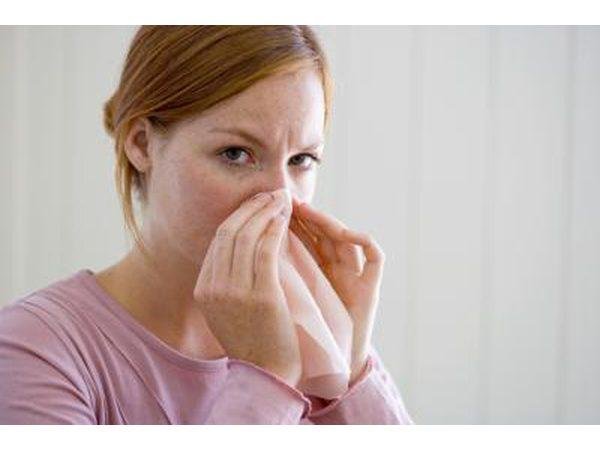What Is Dry Nose?
Nose is a vital organ in the respiratory system with hair strands, which help in purifying air breathed into the lungs by trapping any present particles. Nose also has mucus along its membrane which moisturize the air for easy passage through the respiratory tract. If this mucus dries up and there is no more moisture, then it can result in the dry nose, painful and uncomfortable, especially when blowing or breathing.

Dry Nose Causes
These could be the reasons as to why you have a dry nose:
- Environmental factors such as low levels of humidity like in the case of very hot or cold climates. If you live in an extremely hot and cold environment like those summer and winter seasons, it is likely that you will experience dry nose due to the reduced amount of humid air which at time may result in nose bleeding.
- Infection of the nose by Rhinitis which leads to production of mucus in excess.
- Prolonged use of nasal sprays for decongestion may increase drying and sometimes lead to a chronic state. It is therefore important to use these sprays sparingly and for few days or as per your doctor’s prescription in case of a special case.
- If you are under medications such as antihistamines or decongestants, then you are likely to experience dryness in your nose, mouth, throat and even the eyes.
- Sjogren’s syndrome can also be the cause for a dry nose. Though very rare, this autoimmune disease drains and dries all parts of the body with mucuslining such as the eyes, throat, mouth and nose.
- Hormonal changes and inadequate content of collagen in mucus and skin may also accelerate this kind of dryness in mucus membranes of the body. This mostly affects women in their menopause stage.
- Hypertension/high blood pressure may result in nasal drying and bleeding. It is advisable therefore to have your doctor check for blood pressure levels.
- If you suffer from dehydration you are also likely to experience dryness in your mouth, throat and nose.
Signs & Symptoms
If you experience a dry nose, the following symptoms may be observed:
- Dry nasal mucus
- Nose bleeding or epistaxis
- Low sense of smell
- Headache
- Pain in the sinus
- Rhinitis or sinusitis
- Sore throat
- Mouth breathing
- Irritation in the nose.
Is It Just a Dry Nose or a Dry Sinus?
Dry noses are common and can be treated at home. However, neglecting a dry nose could endanger your health as it could be something else and not just the normal dryness.
This is especially if you have had it for a long period of time in accompaniment with painful headaches and coughs.
There could be a probability of sinus infection and it’s therefore good to visit a doctor for examination. In the case of an infection, these symptoms may be observed:
- A dry mouth
- A dryness along the sinus drainage
- Pain and irritation in the sinus
- Constant headache
When you have a dry nose, it means there is less moisture in the nasal passage and hence this creates room for penetration of bacteria and viruses. Presence of these bacteria leads to a dry sinus infection.
if the nasal lining is dry, then there is no more production of mucus from the nose as the part that produces it will be blocked by dry mucus formed along the nasal membranes and should be treated early to avoid infections.
Sinus infection can be two-way where one occurs when there is mucus and another when the mucus membrane is dry. If there is infected mucus in the sinuses, then bacteria will build up which results in a clogged or congested nose with difficulty in breathing. Nevertheless, in the case of dry sinuses, no clogging or congestion is observed.
A sinus infection can be grow to its chronic state if not treated early and may require surgical procedures when mature. It can easily be confused with the common dry nose and treated locally but will recur in most cases. Medical checkup in early stages is advisable in order to determine the potential of a sinus infection if you experience such symptoms.

Remedies & Treatment
After learning the cause of your nasal dryness, these simple remedies may help in handling and treating it at home:

- A small amount of a moisturizing cream e.g. triple antibiotic ointment such as Neosporin or Bacitracin can be applied on the nostril lining to prevent cracking. Though petroleum jelly is mostly preferred, it is not good if inhaled into the lungs as it may bring about pneumonia.
- A humidifier is very useful when it comes to treating nasal dryness as it adds moisture into the air. You can place it in your room for this purpose. Similarly, a water can may be used in its place by being put on heat vents or radiators in the house so that some of the heated water evaporates adding to moist air in the room.If you are allergic to molds, you should refrain from using a humidifier and consider other remedies.
- Nasal salines or sprays are readily available at a cheap price in most chemists and pharmaceuticals.
- These can be used to moisturize your nostrils. For instance, Neti pot can be used to prepare a saline solution, which can be then sprayed into the nostrils. The nostrils should be sprayed daily and those decongestants should be avoided.
- Spray cans and equipment should be kept clean and dry to avoid bacteria reintroduction into the nose while the reused equipment should also be disposed and replaced after every two weeks.
- A moist or damp tissue can be used to wipe over the nostril lining in order to reduce dryness and irritation.
- Steam can be of help though its effects are not long-term.Bend your head to inhale steam from a jar of hot water to help relieve that feeling of drying in the nose.
- Avoid frequent picking of your nose with fingers and excessively rubbing and blowing even when there is nothing to blow as it may lead to drying and irritation.
- Hydrate your body by taking a lot of water and other fluids such as fruit drinks.
- Refrain from alcohol and caffeine since prolonged use of these can result in a dry nose.
- Use ibuprofen or any other pain killers especially if there is a headache alongside a dry nose. These painkillers should not contain anti-histamines or decongestants in their constituents.
- It is advisable for your doctor to have knowledge of any medication you are using or have used before so that he/she may be able to tell if they are the reason for the dryness. In some cases, prescribed drugs maybe discontinued if they have such effects.
- Exercise regularly as this helps in moisturizing the nasal cavity.
Reference List
- Nasal Hygiene-nosecare.com. Retrieved from
- www.nosecare.com/webdocuments/nasal-hygiene-info-sheet.pdf
- 5 Effective Ways to Treat a Dry Nose- Healthline. Retrieved from
- www.healthline.com/health/cold-flu/ways-to-treat-dry-nose
- Dry nose. Med health. Net. Retrieved from
- www.med-health.net/dry-nose.html
- Causes of Dryness Inside the Nose: What Are Its Home Remedies. Retrieved from
- www.simple-remedies.com/home-remedies/dry-inside-nose-causes-remedies.html
- Dry nose/Causes of Dryness ofthe Nasal Passages/Healthhype.com. Retrieved from
- www.healthhype.com/dry-nose-causes-of dryness-of-the-nasal-passages.htm
- Dry Sinuses-Feel Pain and Dryness in A Mouth- Sinusitis Problem. Retrieved from
- http://sinuscure.org/dry-infection.html

Здравствуйте! Качественный у вас сайт!
Не так давно в форуме нашел ремонт промышленной автоматики в фирме prom electric. Рекомендую!
Удачи!